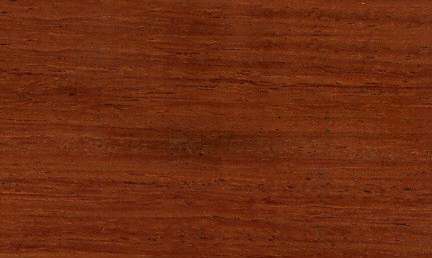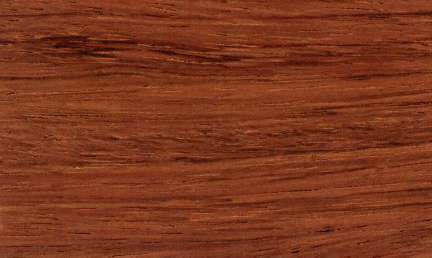 
Bubinga (Guibourtia tessmannii)
Family: Leguminosae
Common names: Akume, Binbinga, Bubinga, Buvenga, Essingang, Kevazingo, Lianu, Moubaka, Mouega, Mutenye, Ovang, Oveng, Waka, Waku
Distributed in: Cameroon, Congo, Equatorial Guinea, Gabon, Zaire (Africa)
Distribution overview: Cameroon, Gabon, Zaire and the Ivory Coast.
Common uses: Boat building (general), Boat building, Boxes and crates, Brush backs & handles, Cabinetmaking, Canoes, Carvings, Chairs, Chests, Concealed parts (Furniture), Decorative veneer, Desks, Dining-room furniture, Domestic flooring, Dowell pins, Dowells, Drawer sides, Figured veneer, Fine furniture, Floor lamps, Flooring, Furniture , Furniture components, Furniture squares or stock, Furniture, Handles, Hatracks, Interior construction, Joinery, Kitchen cabinets, Lifeboats, Living-room suites, Millwork, Mine timbers, Musical instruments, Office furniture, Paneling, Parquet flooring, Plywood, Radio - stereo - TV cabinets, Railroad ties, Rustic furniture, Shafts/Handles, Shipbuilding, Stairrails, Stairworks, Stools, Stringers, Sub-flooring, Tables , Tool handles, Turnery, Utility furniture, Vehicle parts, Veneer: decorative
Product sources: The ITTO reports that the species is a regular source of timber for export. Bubinga is available in lumber form on the US market. Imported logs are massive, and may weigh as much as 10 tons.
Environment profile: Status has not been officially assessed
Tree size: Trunk diameter is 150-200 cm
Colors: the heart isYellow to golden-yellow to orange, Yellow upon exposureand the sapwoodWhitish, Yellow.The grain isWavy, the textureUniformand the lusterLustrous
Natural durability: Susceptible to attack from termites (Isoptera), Susceptible to insect attack
Odor: Unpleasant odor when first cut
Silica Content: Siliceous
Kiln Schedules: T2 - C2 (4/4) US
Kiln Drying Rate: Drying rate is fairly rapid to fast
Drying Defects: Slight end splitting, Slow seasoning prevents degrade
Ease of Drying: Thick Stock Requires Care
Tree Identification: Bole/stem form is straight
Comments: Four fairly well known species, all native to Africa, are represented by the genus Guibourtia. The species are botanically similar but are very different in color. The most plentiful is Bubinga, produced by G. tessmannii , and G. pellegriniana . The rest are Benge or Mutenye which is produced by G. arnoldiana , Ovangkol or Ehie from G. ehie , and Rhodesian copalwood from G. coleosperma , which is less plentiful in international tradeGeneral finishing qualities are rated as good
Blunting Effect: Moderate to severe blunting effect
Boring: Good results
Carving: Generally good results
Cutting Resistance: Fairly Difficult to Very Difficult to saw
Gluing: Glues poorly due to gum pockets
Mortising: Fairly Difficult to Very Difficult
Moulding: Reduction in cutting angle avoids tearing from irregular grain
Movement in Service: Reduction in cutting angle avoids tearing from irregular grain
Nailing: Pre-boring recommended, Very Good to Excellent
Planing: Very Good to Excellent
Resistance to Impregnation: Sapwood is permeable
Response to hand tools: Good response
Routing recessing: Routing yields good results
Sanding: Good sanding qualities
Veneering qualities: Bolt preparation requires steaming, Various figures can yield decorative veneers
Screwing: Possible if prebored, Screwing yields good results; Turning: Very Good to Excellent Results
Polishing: Very Good to Excellent; Staining: Staining is easy; Varnishing: Satisfactory
;
- Numerical data Metric
- Numerical data English
- Strength properties
- References
 |
 |
 |
 |
| Item |
Green |
Dry |
Metric |
| Specific Gravity |
|
0,8 |
|
| Density |
|
897 |
kg/m3 |
| Bending Strength |
1027 |
1572 |
kg/cm2 |
| Crushing Strength |
485 |
708 |
kg/cm2 |
| Hardness |
|
1187 |
kg |
| Impact Strength |
|
|
cm |
| Shearing Strength |
|
121 |
kg/cm2 |
| Stiffness |
131 |
157 |
1000 kg/cm2 |
| Tangential Shrinkage |
8 |
|
% |
| Radial Shrinkage |
5 |
|
% |
| Weight |
849 |
849 |
kg/m3 |
| Maximum Load |
|
|
cm-kg/cm3 |
| Toughness |
|
|
cm-kg |
| Static Bending |
|
|
kg/cm2 |
|
 |  |  |  | | Item | Green | Dry | English | | Bending Strength | 14616 | 22360 | psi | | Density | | 56 | lbs/ft3 | | Hardness | | 2619 | lbs | | Maximum Crushing Strength | 6899 | 10079 | psi | | Shearing Strength | | 1721 | psi | | Stiffness | 1866 | 2242 | 1000 psi | | Specific Gravity | | 0.8 | | | Weight | 53 | 53 | lbs/ft3 | | Radial Shrinkage | 5 | | % | | Tangential Shrinkage | 8 | | % | | Volumetric Shrinkage | 13 | | % | |
Bending strength (MOR) = high
Shrinkage, Radial = fairly large
Max. crushing strength = high
Shrinkage, Tangential = large
Shrinkage, Radial = large
Shrinkage, Volumetric = fairly large
Shrinkage, Tangential = moderate
Density (dry weight) = 53-60 lbs/cu. ft.
Shrinkage, Tangential = small
Shrinkage, Tangential = fairly large
Shearing strength (parallel to grain) = low
Modulus of Elasticity (stiffness) = medium
Hardness (side grain) = hard
Density (dry weight) = 46-52 lbs/cu. ft.
Shrinkage, Volumetric = moderate
Shrinkage, Volumetric = large
Modulus of Elasticity (stiffness) = high
Hardness (side grain) = very hard
Bending strength (MOR) = very high
Shearing strength (parallel to grain) = medium
Density (dry weight) = 61-67 lbs/cu. ft.
Bending strength (MOR) = medium
Bois et Forets des Tropiques,1949,Bubinga (Guiboutia spp,Bois et Forets des Tropiques,No.12,pp429-432Bois et Forets des Tropiques,1977,Bubinga (Guibourtia spp,Bois et Forets des Tropiques,No.173, pp23-35Bolza, E., Keating, W.G.,1972,African Timbers - the Properties, Uses and Characteristics of 700 Species,C.S.I.R.O. Div. of Building ResearchErfurth, T., Rusche, H.,1976,The Marketing of Tropical Wood A. Wood Species from African Moist Forests,F.A.O. Forestry DepartmentFarmer, R.H.,1972,Handbook of Hardwoods,HMSOFrance - C.T.F.T.,1959,Bois a Parquets,C.T.F.T.,Information Tec.,No.6France - C.T.F.T.,1961,Resultats des Observations et des Essais effectues au C.T.F.T. sur Bubinga,(Guibourtia spp.,C.T.F.T.,Information Tec.,No.118France - C.T.F.T.,1966,Bois Tropicaux,C.T.F.T. Publ.,12France - C.T.F.T.,1977,Promotion of African Timbers - New Species,CTFT,35 LeafletsHMSO. 1981.Handbook of Hardwoods, 2nd Edition.Revised by R. H. Farmer.Department of the Environment, Building Research Establishment, Princes Risborough Laboratory, Princes Risborough, Aylesbury, Buckinghamshire.Hughes, J.F.,1971,The Principal Timber Trees of Cameroon,Unpublished dataITTO.1986.Tropical Timber Atlas, Volume 1 - Africa.International Tropical Timber Organization (ITTO) and Centre Technique Forestier Tropical (CTFT, 45bis, Avenue de la Belle Gabrielle, Nogent-sur-Marne Cedex, France.Jay, B.A.,1968,Timbers of West Africa,TRADA, Red Booklet SeriesKline, M. 1978. Guibourtia tessmanii - Bubinga. In A Guide to Useful Woods of the World. Flynn Jr., J.H., Editor. King Philip Publishing Co., Portland, Maine. Page 182.Lincoln, W.A. 1986. World Woods in Color. Linden Publishing Co. Inc., Fresno, California.Organisation for European Economic Co-operation,1951,African Tropical Timber (Nomenclature, Description,OEECRendle, B.J. Editor. 1969. World Timbers, Volume One - Europe & Africa. Published by Ernest Benn Limited, Bouverie House, Fleet Street, London.Rendle, B.J.,1969,World Timbers (3 Vols.,Ernest Benn Ltd. LondonSaint-Aubin, G. de,1963,La Foret du Gabon,CTFT Publ., No.21Sallenave, P.,1955,Proprietes Phyiques et Mecaniques des Bois Tropicaux de l'Union Francaise,C.T.F.TSallenave, P.,1964,Proprietes Physiques et Mecaniques des Bois Tropicaux (Premier Supplement,C.T.F.T. Publ.,no.23Takahashi, A.,1978,Compilation of Data on the Mechanical Properties of Foreign Woods (Part,III) Africa,Shimane University, Japan, Research Report on Foreign Wood No. 7
|









